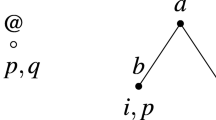Abstract
We examine the paradox of the surprise examination using dynamic epistemic logic. This logic contains means of expressing epistemic facts as well as the effects of learning new facts, and is therefore a natural framework for representing the puzzle. We discuss a number of different interpretations of the puzzle in this context, and show how the failure of principle of success, that states that sentences, when learned, remain to be true and come to be believed, plays a central role in understanding the puzzle.
Similar content being viewed by others
References
C. E. Alchourrón P. Gärdenfors D. Makinson (1985) ArticleTitleOn the logic of theory change: partial meet contraction and revision functions Journal of Symbolic Logic 50 510–530 Occurrence Handle10.2307/2274239
Baltag, A.: 2003, Logics for communication: reasoning about information flow in dialogue games. Lecture notes for NASSLLI 2003, http://www.indiana.edu/nasslli/program.html .
A. Baltag L. S. Moss (2004) ArticleTitleLogics for epistemic programs Synthese 139 IssueID2 165–224 Occurrence Handle10.1023/B:SYNT.0000024912.56773.5e
R. Binkley (1969) ArticleTitleThe surprise examination in modal logic Journal of Philosphy 65 127–136 Occurrence Handle10.2307/2024556
T. Y. Chow (1998) ArticleTitleThe surprise examination or unexpected hanging paradox American Mathematical Monthly 105 IssueID1 41–51 Occurrence Handle10.2307/2589525
Gerbrandy, J.: 1998, Bisimulations on planet Kripke. Ph.D. thesis, Universiteit van Amsterdam. ILLC Dissertation Series DS-1999-01.
J. Gerbrandy W. Groeneveld (1997) ArticleTitleReasoning about Information Change Journal of Logic, Language and Information 6 IssueID2 147–169 Occurrence Handle10.1023/A:1008222603071
A. S. Gillies (2001) ArticleTitleA new solution to Moore’s paradox Philosophical Studies 105 237–250 Occurrence Handle10.1023/A:1010361708803
J. Halpern Y. Moses (1986) ArticleTitleTaken by surprise: the paradox of the surprise test revisited Journal of Phosophical Logic 15 IssueID3 281–304
Heim, I.: 1982, On the semantics of definite and indefinite noun phrases. Ph.D. thesis, University of Amherst.
Landman, F.: 1986, Towards a theory of information. Ph.D. thesis, Universiteit van Amsterdam. Also appeared as GRASS 6 with Foris Publications, Dordrecht, Holland/Cinnaminson, U.S.A.
Montague, R. and R. Kaplan: 1960, A paradox regained. Notre Dame Journal of Formal Logic 3.
J. Plaza (1989) Logics of public communications M. Emrich M. Pfeifer M. Hadzikadic Z. Ras (Eds) Proceedings of the 4th International Symposium on Methodologies for Intelligent Systems Academic Press New York 201–216
E. Sober (1998) ArticleTitleTo give a surprise exam, use game theory Synthese 115 355–373 Occurrence Handle10.1023/A:1005012607804
Sorensen, R.: 1988, Blindspots. Clarendon Press.
R. C. Stalnaker (1978) Assertion P. Cole (Eds) Pragmatics (Syntax and Semantics 9) Academic Press New York 315–312
J. Benthem Particlevan (1997) ArticleTitleOn what one may come to know Analysis 64 IssueID2 95–105 Occurrence Handle10.1111/j.1467-8284.2004.00467.x
H. Ditmarsch Particlevan B. Kooi (2006) ArticleTitleThe secret of my success Synthese 151 IssueID2 201–232 Occurrence Handle10.1007/s11229-005-3384-9
P. Emde Boas Particlevan J. Groenendijk M. Stokhof (1984) The Conway paradox: its solution in an epistemic framework J. Groenendijk T. M. V. Janssen M. Stokhof (Eds) Truth, Interpretation and Information: Selected Papers from the Third Amsterdam Colloquium Foris Publications Dordrecht 159–182
F. Veltman (1996) ArticleTitleDefaults in update semantics Journal of Philosophical Logic 25 221–261 Occurrence Handle10.1007/BF00248150
C. Wright A. Sudbury (1977) ArticleTitleThe paradox of the unexpected examination Australasian Journal of Philosophy 55 41–58 Occurrence Handle10.1080/00048407712341031
Author information
Authors and Affiliations
Corresponding author
Rights and permissions
About this article
Cite this article
Gerbrandy, J. The Surprise Examination in Dynamic Epistemic Logic. Synthese 155, 21–33 (2007). https://doi.org/10.1007/s11229-005-2211-7
Issue Date:
DOI: https://doi.org/10.1007/s11229-005-2211-7




